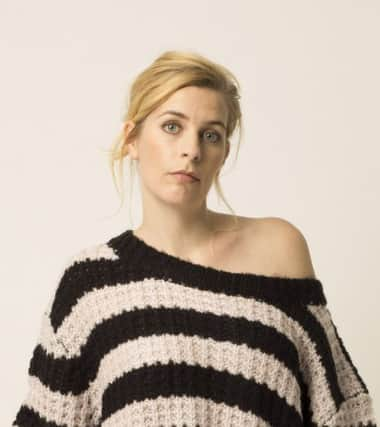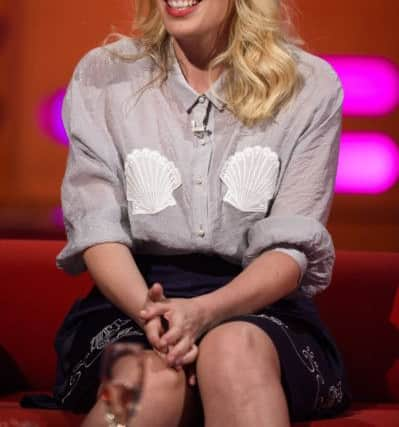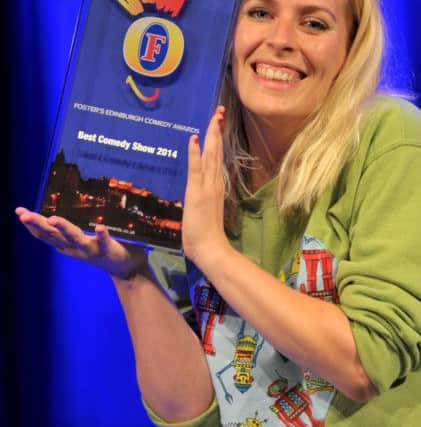Interview: Comedian Sara Pascoe on her new book, Animal


Comedian, actor and writer Sara Pascoe finds humour in the human condition but there are some things you just can’t do in an hour of stand up because they’re not funny. Or at least, not the way she tells them. Especially when they’re about her. Abortion for instance, carving the word ‘fat’ into your thigh, or when you have a sexual experience that isn’t consensual. That’s not to say that these are comedic no-go areas, it’s just that when Pascoe is talking about them, she’s not joking. That’s why she’s poured them all into her first book, Animal: The Autobiography of a Female Body.
Part semi-autobiography, part evolutionary history, it’s a light-hearted science book that attempts to sum up what it is that shapes and moulds women and what it was like for her to grow up in – and continue to inhabit – a female body. Serious, very funny, entertaining and informative, there’s nothing Pascoe shies away from, from clitorectomies to Jason Donovan, as she examines a specific part or aspect of the human female body in each chapter.
Advertisement
Hide AdPascoe is busy promoting the book – tonight she’s at the Borders Book Festival in Melrose – and also in the middle of a nationwide tour that sees her at the Stand comedy clubs in Glasgow and Edinburgh this week.


“It’s not the same material in the show,” says Pascoe. “There’s a tiny bit of overlap but I’ve tried to keep it separate because I would be annoyed if I had booked a stand-up show and then later bought the book and thought, ‘hang on, this is all your routines’. Also, when I did the book, I was thinking about women and female bodies, but the show is more general, about empathy and compassion, and their limitations.
“Empathy is important,” she says. “Watching the news, there seems to be an empathy failure and miscommunication. There’s social media where people’s politics are out there, they’re forwarding articles and seem engaged, but it’s only online. We tweet and pat ourselves on the back, thinking we have done something, said we’re interested, but it needs more work.
“If we accept ourselves as animals, and have empathy and tolerance, compassion to others, understand that humans are territorial, aggressive and have gender aspects, then we can change things,” she says.
On TV and stage, Pascoe is sparky, funny, fast-talking and confessional, spilling out details of her personal life, and gloriously indiscreet. Off stage, in conversation she’s quieter, considered, thoughtful.


Raised in Dagenham, the 35-year-old daughter of Derek Pascoe, a singer in 1970s group Flintlock and Gail, his most ardent teenage fan, Pascoe is everywhere at the moment. A fixture on the comedy circuit, she burst onto the scene with her 2010 Edinburgh show and was nominated for a Fosters Comedy Award for Best Show in the 2014 Fringe. She’s all over TV in Live At The Apollo, QI, Never Mind the Buzzcocks, Mock the Week, Stand Up For The Week and Would I Lie to You? She sent up the world of PR in W1A, Twenty Twelve and The Thick of It for the BBC. On top of that she writes for the Guardian, Independent and Standard Issue magazine.
Advertisement
Hide AdIt was while researching her latest live show that she realised she wanted to explore the issues of female sexuality and evolution further, without the need to race to a punchline.
“If something isn’t funny you can’t put it in your show or it’s just you going, ‘here’s some facts, guys’, and people don’t like it. They think ‘we don’t want to be lectured about consent law, or child marriage’, but in a book it’s too late. Ha, ha, you’ve bought the book! In the book I can juxtapose silly routines and something serious.”
Advertisement
Hide AdIf the impetus to write the book came from her stand-up shows, her interest in the subject of female evolution goes back much further.


When her dad had an affair (or seven, as it turned out), and her parents’ marriage broke down, her mother rationalised it in a series of lectures Pascoe likes to call The End of Hope. The gist was to explain her father’s behaviour in evolutionary terms – men couldn’t help being attracted to women and women needed to pair bond to successfully rear children, so men and women were doomed to disappoint each other. Pascoe went with this and ran her relationships accordingly (and unsatisfactorily) for the next ten years, until she had an epiphany reading Sex at Dawn. Co-written by Cacilda Jethá and Christopher Ryan, this 2010 book on the evolution of monogamy in humans and human mating systems challenged conventional wisdom by suggesting that women too had a sexuality and to paraphrase, have historically taken more of a spread betting approach to mating.
As Pascoe tells it in her book, the scientists who discovered evolution were Victorian men, with their monocles, top hats and a mistaken belief that women preferred “chit-chat” to sex, with Darwin describing wives as “an object to be beloved and played with, better than a dog anyhow.” Freud comes in for a bit of a kicking too, you won’t be surprised to learn.
Such is Pascoe’s outrage at women’s betrayal by science that in the book her prose becomes shouty with capitals. And when it comes to the idea that evolution and the fact we are animals might threaten her current pair bonding with John Robins, also a comedian who Pascoe met in 2012 at the Edinburgh Fringe, she’s tells the reader she’s sitting at her screen in tears as she types.
Given that one of Pascoe’s reasons for writing the book was that it might mean she cried less, does this mean it’s not working?


“It depends where I am in my menstrual cycle,” she says. “I’m just due on my period and was doing a book launch and the audience were asking questions and making comments. There was a woman with an autistic daughter, and she was speaking about that, and then Jo Brand, and Caitlin Moran were mentioned [she’s a big fan of both] and I thought, ‘Oh God, I’m going to cry.’ It’s not emotional, but sometimes It’s too much for my body to take.”
Advertisement
Hide AdPart of Pascoe’s shtick is sharing personal stuff others might shy away from, but she can’t see herself doing her comedy any other way. She had no qualms about writing about her abortion, despite advice from the publishers and her mum not to.
“You’re exposing yourself and you have to be OK with that. What about people who disagree with you? You have to be OK with that as well. And some things are going to be wrong and someone clever in the audience will know more than you do. And you will disagree with yourself in six months anyway.
Advertisement
Hide Ad“But you can only get this knowledge over to people who want to know. And those who listen will think this bit resonates and that bit’s rubbish and you have to let them. Or it’s North Korea.”
She doesn’t regard herself as a “female comedian”, comedian will do, but her material is often about being a woman, because, well, she is one.
“You don’t represent all women but you are a woman. And you shouldn’t not talk about it if you want to. What I have realised is that there’s a small minority of men, the kind of men if a woman walked on stage, they are never going to be won over, it doesn’t matter how well you do it. They won’t like you. So ignore them. And accept that not everyone is going to find you funny. But if you write a good enough joke, that will f*** them. So why should we be thinking, I won’t mention my period in case I make that man in his fifties feel gross. Oh God! Periods happen to half of humanity. We are people too…”
She credits her mum for enabling her approach,“My mum was very open about sex and periods and I was brought up to be very open and not ashamed and that’s all from her.”
After much musing on the nature of gender, Pascoe has decided that it’s her mind that’s female, not so much her body, and there are aspects of womanhood that she still struggles with.
“I don’t feel like a very feminine woman sometimes,” she says. “I feel manly. When I was in my twenties I would say I was a masculine girl and now I realise the whole idea of femaleness is a construct. I’m a boyish girl, who talks over people and I do a boyish job. But that doesn’t mean because you do that that you have male attributes. I do it as a woman.
Advertisement
Hide Ad“When I was a teenager, the girls who were feminine like that and used it to manipulate people, you could see through them… it’s unfeminist thinking.”
On the other hand, it would be nice if her boyfriend offered to lift heavy things occasionally, she says. “But he’s not not doing it to make a point, is he?” She laughs.
Advertisement
Hide AdHe may not be big on heavy lifting but Robins was supportive during the writing of the book, although Pascoe admits some of the subject matter made for heavy breakfast table chat.
“Child brides or obstetric problems, sometimes it was full on for him,” she says.
Then there’s Gail and Derek, Pascoe’s parents, whose divorce and its ramifications for Pascoe are laid bare in the book. How do they feel about it?
“I did think about what if my dad hated it, because he hasn’t read it yet. But he just said he trusted me. We have yet to find out if he was correct.” She laughs, slightly nervously. “But I have said much worse about him in my shows.”
As for her mother, Pascoe takes the opportunity to redress the balance of the relationship after the cut and thrust of the teenage years.
“You get to rewrite history. And I wanted my mum to seem like a hero because when I was a teenager I was very judgmental and we didn’t get on very well. Part of being an adult is seeing parents as humans.”
Advertisement
Hide AdOne of the appealing things about Pascoe is that she is happy to be undecided, unsure, non-judgmental, still making up her mind, a work in progress, happy to admit to a practice she calls “flip-flopping”.
“I’m so impressed by people having strong opinions. For example, Brexit. I mean, how do you know? I flip-flop all the time. And climate change in the North Pole. It’s Esso and the oil companies and I was clear on this, then I remember sitting on a plane to Australia, thinking ‘hang on, I’m flying to Oz just for pleasure!’ If you live in a western world society, with everything you eat and use, you are part of a biblical plague.”
Having kids is another thing she “flip flops” about.
Advertisement
Hide Ad“One minute I definitely want to adopt them and have them, but the next I’m listing all the things I can do now and would miss.”
Things she can do now include continuing her diet of stand-up, writing and acting and Pascoe loves them all.
“I’m greedy for all of them. I want to keep that up. Things like Would I Lie to You? you love it but if you did them all the time, you’d get anxious because you’ve said loads but been edited out and you have to read the news and know who the prime minister is and how to pronounce his name.”
“And doing something like The Thick of It, I loved that. I was being shouted at by Peter Capaldi and they had to stop filming and say ‘can you please stop smiling, he’s shouting at you’. And I thought, you just let a fan on set, what do you expect?
“Writing makes me feel in control. It’s like doing a school project. And the show is social, and good fun because writing can make you a bit mad when you don’t speak to people all day.”
There’s more writing in the pipeline, with a second book on the way. So if you’re feeling left out with all her talk about women’s bodies and evolution – perhaps you’re one of those men Pascoe encounters in audiences who can’t stand her and thinks women just aren’t funny – don’t worry because Pascoe is now turning her attention to men, with a book on the male body.
What is she going to call this next book then?
Advertisement
Hide Ad“Manimal. Although I might be sick of that title in six months.
“It’s exciting,” she says. “It’s about things that affect both genders more; like sex work and pornography. I’m going to do both sides rather than just giving my subjective opinion.
Advertisement
Hide Ad“I want to talk about the male body and masculinity and ideas. It’s looking at men from outside so it’s very different from the last book. Obviously I can’t say ‘this is my experience’, but I can use interviews, or I could say it looks to me that a man is doing this.” She pauses, weighing this up.
“That might be very patronising,” she says, and laughs, not caring one bit.
• Animal: The Autobiography of a Female Body by Sara Pascoe is published by Faber & Faber, £12.99 paperback, £7.99ebook, out now. She is on tour with Animal until 2 July. For details see sarapascoe.com. She will be at The Borders Book Festival today, www.bordersbookfestival.org, 9.15pm, and at The Stand, Edinburgh tomorrow and The Stand, Glasgow on Monday, www.thestand.co.uk